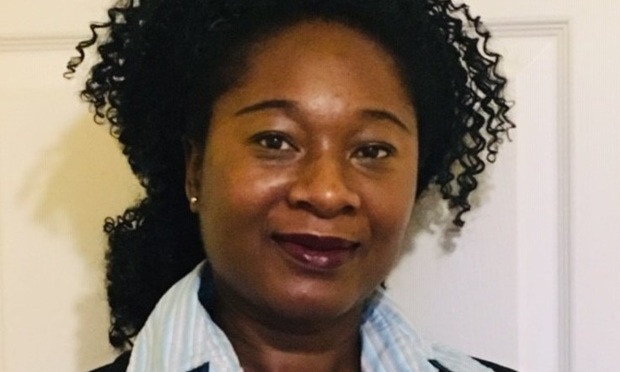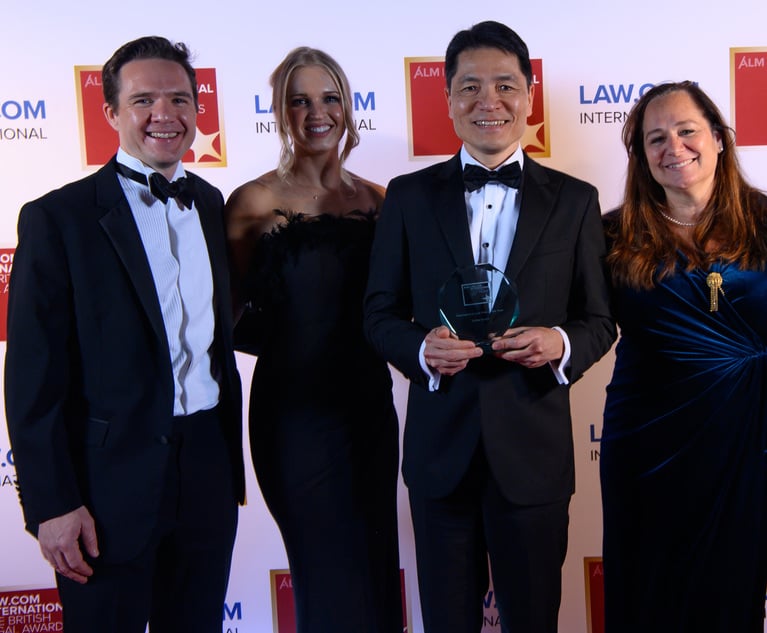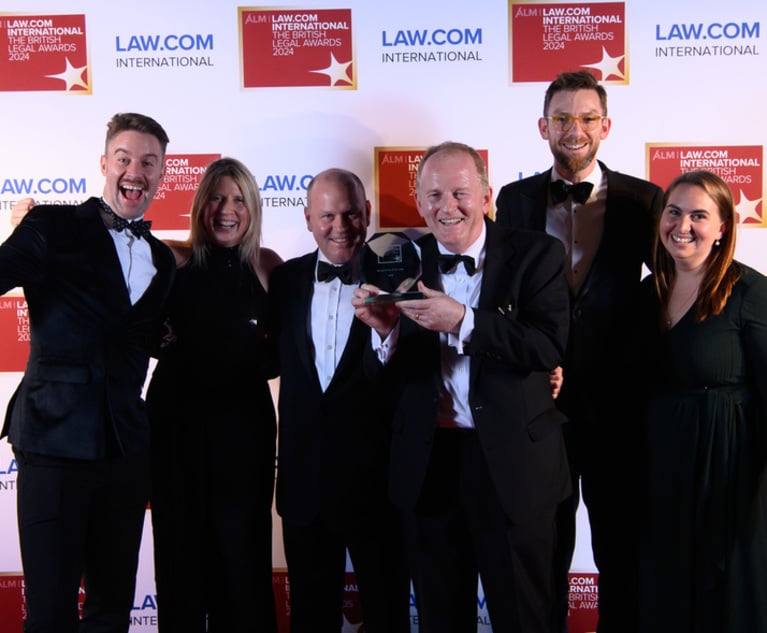Q&A: Hays' General Counsel On The Best Diversity Strategies
Evelyn Styles, U.K. general counsel at Hays since 2010, talks about her trusted advisers and which initiatives have impressed her.
June 26, 2019 at 06:08 AM
5 minute read
 Evelyn Styles, Hays
Evelyn Styles, Hays
Much has been made of efforts by in-house lawyers to improve diversity in the profession by demanding more of their external advisers. So what is it specifically that they want?
A major women in law networking group – Women, Influence & Power in Law (WIPL) – is holding its first event in the U.K. later this year, and ahead of its launch, Legal Week spoke with one of its board members to find out.
Evelyn Styles is the U.K. and Ireland general counsel of recruitment consultancy Hays, which has an annual turnover of £3.6 billion, operates in 33 countries and has more than 10,000 employees. She runs a six-lawyer team, which handles most matters in-house.
Do you have a legal panel?
We don't have a formal legal panel, but have preferred firms that we use. These are Mischon de Reya, Pinsent Masons, Herbert Smith Freehills, Shoosmiths, and Wallace & Partners.
How did you come to choose these advisers?
It's more of a historical reason because we have longstanding relationship with them – we worked with them before I even joined Hays.
Other reasons for them being our trusted advisers include their knowledge of the recruitment sector – Mishcon especially is quite renowned for this. So that's something that attracted us.
Back in 2008, we did look at selecting a panel of solicitors and at the time Pinsent Masons was chosen, but now we don't really think of it as a panel and our work with them is more ad-hoc.
Has Hays put an increasing focus on diversity and inclusion over time?
Absolutely. Because we're one of the largest recruitment specialists and are present in 33 countries, we view diversity with utmost importance. Our initiatives include supporting flexible and agile working for parents and other people who need it, an active LGBT group, and an employee assistance programme, among other things.
In 2017, we were awarded the National Equality Standard accreditation. We were one of first UK firms to get this.
For us as a legal department, we have 56 lawyers overall, 40 of who are female. So that's great. This was achieved not so much through targets, but instead through creating a culture where individuals feel they can apply to work at Hays without having any challenges around issues such as being a parent.
We have also established a leading women's network, which aims to lead women's career progression forward. It currently has 4,500 members.
How can you work with your legal advisers to encourage these same standards?
Where our relationship commits us, we can help our clients if we work with them on dedicated recruitment campaigns, helping them achieve more diverse talent pool. So on a day-to-day basis, the recruitment consultants discuss it with clients in our legal recruitment function.
Do you consider law firm diversity when awarding or withholding work?
I don't necessarily think about giving/withholding work at the moment because the law firms we work with have good strategies in place already.
Which diversity initiatives have you seen work really well in the legal sector?
I've seen a number of law firms, including Herbert Smith Freehills, set up strategies for diversity and inclusion, so there's a number of them doing it now, whereas in the past it used to just be publishing an equal opportunities policy. One strategy I think works really well is one HSF does, and that's having one individual appointed who is solely responsible for working on the firm's diversity and inclusion efforts.
What do you think is the main factor holding law firms back from achieving better diversity?
Even though I haven't worked in private practice in a long time, I suspect it'll be the same themes. One is the lack of agile working schemes for parents.
Another is that firms need to make sure they're not just targeting candidates from certain socioeconomic backgrounds. Firms should be looking more at that, even though I know quite a few are already working on that. Then they also need to look at their general recruitment process: how to make their job adverts more attractive to more diverse candidates.
What are some of the key topics the WIPL event will talk about?
There are two key topics that I think will be really interesting regarding technology: one of them being smart contracts and whether they will replace in-house lawyers. There's been lots of debate around technology and whether the role of the lawyer will disappear completely.
There's interesting new legal technology for contract review, which has led to lots of debates about the role of the lawyers and what the future for lawyers is. I don't believe technology will ever replace lawyers but it will enable us to provide a more efficient service.
And in general it will be interesting to have conversations between GCs to hear what the best practice for in-house lawyers is. It'll be a combination of both discussions on technology and discussions on diversity, the challenges faced and solutions everyone can look towards.
Women, Influence & Power in Law UK will take place on November 19-21, 2019. Having built the event in the U.S. to a large size, the event is being brought across to London for female-only in-house and private practice lawyers to come together over a few days to discuss the biggest issues in today's legal market. For more information see here.
This content has been archived. It is available through our partners, LexisNexis® and Bloomberg Law.
To view this content, please continue to their sites.
Not a Lexis Subscriber?
Subscribe Now
Not a Bloomberg Law Subscriber?
Subscribe Now
NOT FOR REPRINT
© 2025 ALM Global, LLC, All Rights Reserved. Request academic re-use from www.copyright.com. All other uses, submit a request to [email protected]. For more information visit Asset & Logo Licensing.
You Might Like
View All
International Law Firm of the Year: A Q&A with Sidley Austin's London Managing Partner
5 minute read
Inside Travers Smith's AI Training, Development Efforts

From Olympic Aspirations to Legal Innovation: Tom Dunlop's Journey to Founding Summize
8 minute readTrending Stories
- 1'It's Not Going to Be Pretty': PayPal, Capital One Face Novel Class Actions Over 'Poaching' Commissions Owed Influencers
- 211th Circuit Rejects Trump's Emergency Request as DOJ Prepares to Release Special Counsel's Final Report
- 3Supreme Court Takes Up Challenge to ACA Task Force
- 4'Tragedy of Unspeakable Proportions:' Could Edison, DWP, Face Lawsuits Over LA Wildfires?
- 5Meta Pulls Plug on DEI Programs
Who Got The Work
Michael G. Bongiorno, Andrew Scott Dulberg and Elizabeth E. Driscoll from Wilmer Cutler Pickering Hale and Dorr have stepped in to represent Symbotic Inc., an A.I.-enabled technology platform that focuses on increasing supply chain efficiency, and other defendants in a pending shareholder derivative lawsuit. The case, filed Oct. 2 in Massachusetts District Court by the Brown Law Firm on behalf of Stephen Austen, accuses certain officers and directors of misleading investors in regard to Symbotic's potential for margin growth by failing to disclose that the company was not equipped to timely deploy its systems or manage expenses through project delays. The case, assigned to U.S. District Judge Nathaniel M. Gorton, is 1:24-cv-12522, Austen v. Cohen et al.
Who Got The Work
Edmund Polubinski and Marie Killmond of Davis Polk & Wardwell have entered appearances for data platform software development company MongoDB and other defendants in a pending shareholder derivative lawsuit. The action, filed Oct. 7 in New York Southern District Court by the Brown Law Firm, accuses the company's directors and/or officers of falsely expressing confidence in the company’s restructuring of its sales incentive plan and downplaying the severity of decreases in its upfront commitments. The case is 1:24-cv-07594, Roy v. Ittycheria et al.
Who Got The Work
Amy O. Bruchs and Kurt F. Ellison of Michael Best & Friedrich have entered appearances for Epic Systems Corp. in a pending employment discrimination lawsuit. The suit was filed Sept. 7 in Wisconsin Western District Court by Levine Eisberner LLC and Siri & Glimstad on behalf of a project manager who claims that he was wrongfully terminated after applying for a religious exemption to the defendant's COVID-19 vaccine mandate. The case, assigned to U.S. Magistrate Judge Anita Marie Boor, is 3:24-cv-00630, Secker, Nathan v. Epic Systems Corporation.
Who Got The Work
David X. Sullivan, Thomas J. Finn and Gregory A. Hall from McCarter & English have entered appearances for Sunrun Installation Services in a pending civil rights lawsuit. The complaint was filed Sept. 4 in Connecticut District Court by attorney Robert M. Berke on behalf of former employee George Edward Steins, who was arrested and charged with employing an unregistered home improvement salesperson. The complaint alleges that had Sunrun informed the Connecticut Department of Consumer Protection that the plaintiff's employment had ended in 2017 and that he no longer held Sunrun's home improvement contractor license, he would not have been hit with charges, which were dismissed in May 2024. The case, assigned to U.S. District Judge Jeffrey A. Meyer, is 3:24-cv-01423, Steins v. Sunrun, Inc. et al.
Who Got The Work
Greenberg Traurig shareholder Joshua L. Raskin has entered an appearance for boohoo.com UK Ltd. in a pending patent infringement lawsuit. The suit, filed Sept. 3 in Texas Eastern District Court by Rozier Hardt McDonough on behalf of Alto Dynamics, asserts five patents related to an online shopping platform. The case, assigned to U.S. District Judge Rodney Gilstrap, is 2:24-cv-00719, Alto Dynamics, LLC v. boohoo.com UK Limited.
Featured Firms
Law Offices of Gary Martin Hays & Associates, P.C.
(470) 294-1674
Law Offices of Mark E. Salomone
(857) 444-6468
Smith & Hassler
(713) 739-1250









